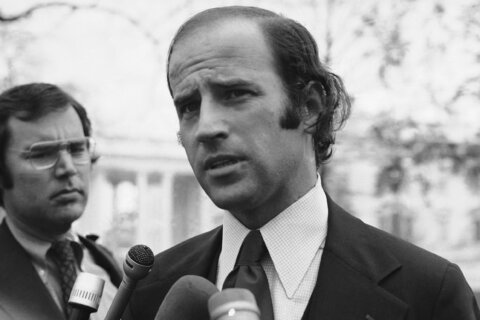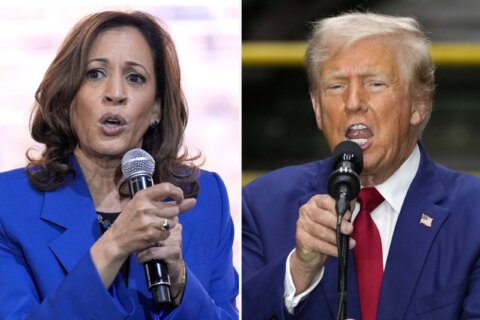Visit the Election 2024 page for WTOP’s comprehensive coverage. Listen live to 103.5 FM for the latest.
President Joe Biden made history Sunday when he announced he will no longer seek reelection, instead endorsing Vice President Kamala Harris for the Democratic Party nomination.

Biden’s withdrawal came 107 days ahead of Election Day — a last-minute shake-up, even compared to other incumbent presidents who opted not to continue in their races despite being eligible for second terms. President Harry S. Truman dropped out 220 days before the 1952 election, and President Lyndon B. Johnson did the same 219 days before the 1968 election, according to Poynter.
Biden’s political career has spanned nearly 50 years, including his victory in the 2020 election, which was a rare moment in American politics: He defeated an incumbent president, Donald Trump, who had been a catalyst for a seething sense of polarization.
USA Today Washington Bureau Chief Susan Page joined WTOP’s John Aaron and Michelle Basch to discuss the historical context surrounding Biden’s departure from the race, and how his decision might affect his overarching political legacy.
Listen to the full interview below or read the transcript, which has been lightly edited for clarity.
Susan Page: We have no template for this. This hasn’t happened in modern times where we’re 100 days, about, before the election and we have a change in the Democratic nominee, the presumptive nominee and the incumbent president. So while we’ve gotten off to kind of a fast start here — I mean, in the space of a couple hours, we saw Vice President Harris really command significant support in the Democratic Party — it’s certainly not over yet. We’re going to have, I think, some weeks of real turbulence ahead as Democrats figure out what they’re doing and as Republicans figure out how to counter this new and unexpected challenger to former President Trump.
John Aaron: And you just wrote about President Biden’s legacy in light of how things have sort of ended here. What is the President’s legacy?
Susan Page: You know, I think it was concern about protecting his legacy that was the final straw that convinced him to step away from this nomination, which he was very reluctant to do. He has a legacy of someone who has had a remarkable political career for half a century, and who took over the presidency at a time of great turmoil and trouble. And the concern, I think, from some of his advocates was he was going to lead the party to disaster this November and obscure other aspects of his legacy. Now he’s chosen, of course, not to do that.
Michelle Basch: Kind of interesting that he started as such a young person in the political world and now, you know, he’s run into these age issues.
Susan Page: You know, Michelle, that’s right. When he was first elected to the Senate, when he was sworn in, he was 30 years old. People would say, “Are you too young to be a senator?” He would say, “Watch me.” And that is just what he was saying in his 80s — 81 years old now, the oldest president in American history, when questions were raised about his mental acuity, but I think he just reached the point where those questions about his ability, his fitness for another four years in office, just took over. And now he’s taking this quite historic step of stepping back.
John Aaron: Susan, we were just talking about the president’s legacy, and the logic for him stepping down being to preserve his legacy. But does this count as a graceful exit being that he botched the debate performance so badly that he got to this point?
Susan Page: Well, I think there will be questions about why he chose to run for another term. You know, certainly it would have been easier for Democrats to have a graceful transition if he had never announced he was going to seek a second term or if he had made this announcement at the end of last year instead of now, so late in this process, but I think that will be for another day. I think we are in for an amazing 100 days ahead of us, including the next couple of weeks before the Democratic Convention in Chicago.
The Associated Press contributed to this report.
- Sign up for WTOP’s Election Desk newsletter for headlines and analyses through Inauguration Day.
- DC-area leaders react to President Biden withdrawing from White House race
- Harris praises Biden’s ‘unmatched’ legacy, claims many of the delegates she needs for the nomination
- Trump, GOP lawmakers react to Biden’s decision to leave presidential race
- Biden’s legacy: Far-reaching accomplishments that didn’t translate into political support
Get breaking news and daily headlines delivered to your email inbox by signing up here.
© 2024 WTOP. All Rights Reserved. This website is not intended for users located within the European Economic Area.






